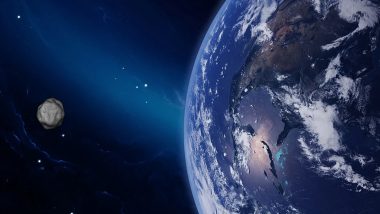London, August 31: Earth's water may have come from materials that were present in the inner solar system at the time the planet formed -- instead of far-reaching comets or asteroids delivering such water, according to a study.
Researchers, including those from the Universite de Lorraine in France, determined that a type of meteorite called enstatite chondrite contains sufficient hydrogen to deliver at least three times the amount of water contained in the Earth's oceans. Dent in Earth’s Magnetic Field! NASA Monitors Strange Anomaly That Could Damage Satellites and Spacecraft.
The scientists noted that enstatite chondrites are entirely composed of material from the inner solar system -- essentially the same stuff that made up the Earth originally. "Our discovery shows that the Earth's building blocks might have significantly contributed to the Earth's water," said Laurette Piani, lead author of the study published in the journal Science. Close Miss! Car-Sized Asteroid 2020 QG Flew Past The Earth on Weekend Without Getting Noticed by Scientists; Know If It Was Doomsday-Inducing Event?
"Hydrogen-bearing material was present in the inner solar system at the time of the rocky planet formation, even though the temperatures were too high for water to condense," Piani said. The findings are surprising because the Earth's building blocks are often presumed to be dry, the researchers said.
These blocks come from inner zones of the solar system where temperatures would have been too high for water to condense and come together with other solids during planet formation, they said. The meteorites provide a clue that water didn't have to come from far away, according to the researchers.
"The most interesting part of the discovery for me is that enstatite chondrites, which were believed to be almost 'dry,' contain an unexpectedly high abundance of water," said Lionel Vacher, a postdoctoral researcher at Washington University in the US.
Vacher prepared some of the enstatite chondrites in this study for water analysis while he was completing his PhD at Universite de Lorraine
Enstatite chondrites are rare, making up only about 2 per cent of known meteorites in collections, the researchers said.
However, their isotopic similarity to Earth make them particularly compelling, they said. According to the researchers, enstatite chondrites have similar oxygen, titanium and calcium isotopes as Earth, and their study showed that their hydrogen and nitrogen isotopes are similar to Earth's, too.













 Quickly
Quickly











